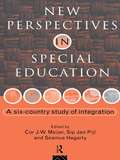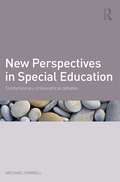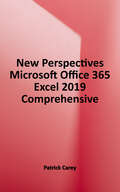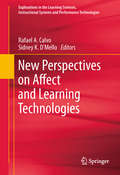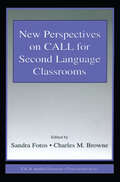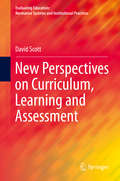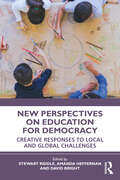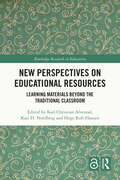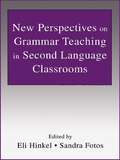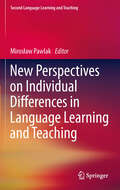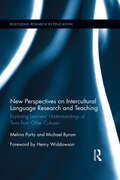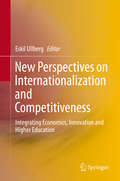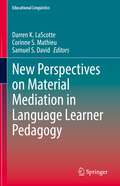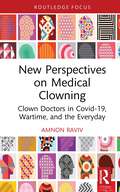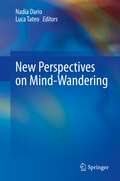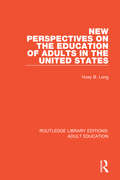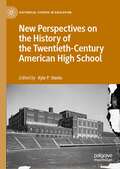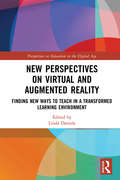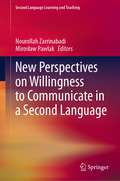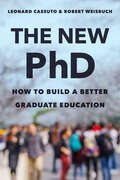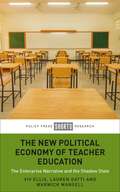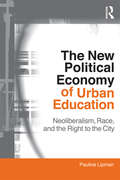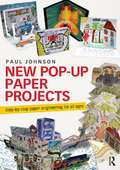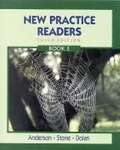- Table View
- List View
New Perspectives in Special Education: A Six-country Study of Integration
by Cor J.W. Meijer Sip Jan Pijl Seamus HegartyIt is now widely believed in many Western countries that the segregation of students with special educational needs is problematic, and that wherever possible these students should be educated alongside their peers in regular education settings. There has been a general move towards integrating special and regular education into one system that caters for a much wider range of students. But the outcomes in various countries have been very different. This book describes and evaluates these outcomes. The book provides both quantitative and qualitative information, analysing the similarities and differences between integration practices in six Western countries.
New Perspectives in Special Education: Contemporary philosophical debates
by Michael FarrellThis book should be read by everyone who wants to understand special education today. New Perspectives in Special Education opens the door to the fascinating and vitally important world of theory that informs contemporary special education. It examines theoretical and philosophical orientations such as ‘positivism’, ‘poststructuralism’ and ‘hermeneutics’, relating these to contemporary global views of special education. Offering a refreshingly balanced view across a broad range of debates, this topical text guides the reader through the main theoretical and philosophical positions that may be held with regard to special education, and critically examines positions that often go unrecognised and unquestioned by practitioners and academics alike. It helps the reader to engage with and question the positions taken by themselves and others, by providing thinking points and suggestions for further reading at the end of each chapter. Perspectives covered include: Positivism and empiricism Phenomenology and hermeneutics Historical materialism and critical theory Holism and constructivism Structuralism and post structuralism Pragmatism and symbolic interactionism Psychoanalysis Postmodernism and historical epistemology Anyone wishing to gain a fuller understanding of special education should not be without this stimulating and much needed text.
New Perspectives Microsoft Office 365 and Excel 2019 Comprehensive
by Patrick CareyDevelop the Microsoft Office 365 and Excel 2019 skills students need to be successful in college and beyond with the emphasis on critical-thinking, problem-solving, and in-depth coverage found in NEW PERSPECTIVES MICROSOFT OFFICE 365 & EXCEL 2019 COMPREHENSIVE. Updated with all-new case scenarios, this edition clearly applies the skills students are learning to real-world situations to make concepts even more relevant across the applications and reinforces critical skills to make them successful in their educational and professional careers. NEW PERSPECTIVES MICROSOFT OFFICE 365 & EXCEL 2019 COMPREHENSIVE demonstrates the importance of what students are learning while strengthening your skills and helping students transfer those skills to other applications and disciplines for further success. In addition, MindTap and updated SAM (Skills Assessment Manager) online resources are available to guide additional study and ensure successful results.
New Perspectives on Affect and Learning Technologies
by Rafael A. Calvo Sidney K. D'MelloThis monograph integrates theoretical perspectives on affect and learning with recent research in affective computing with an emphasis on building new learning technologies. The "new perspectives" come from the intersection of several research themes: - Basic research on emotion, cognition, and motivation applied to learning environments - Pedagogical and motivational strategies that are sensitive to affective and cognitive processes - Multimodal Human Computer Interfaces, with a focus on affect recognition and synthesis - Recent advances in affect-sensitive Intelligent Tutoring Systems - Novel methodologies to investigate affect and learning - Neuroscience research on emotions and learning
New Perspectives on CALL for Second Language Classrooms (ESL & Applied Linguistics Professional Series)
by Sandra Fotos Charles BrowneThis practical handbook is designed to help language teachers, teacher trainers, and students learn more about their options for using computer-assisted language learning (CALL) and develop an understanding of the theory and research supporting these options. The chapters in New Perspectives on CALL for Second Language Classrooms synthesize previous CALL theory and research and describe practical applications to both second and foreign language classrooms, including procedures for evaluating these applications. The implementation of CALL at the institutional level is also addressed, with attention to designing multimedia language laboratories and creating collaborative CALL-based projects between educational institutions. Although many chapters locate their descriptions of CALL activities and projects within the ESL/EFL setting, the principles and activities described are equally useful for other language settings. The book does not require prior knowledge of CALL, computers, or software. To assist readers, a glossary of CALL terms and an appendix of CALL Web sites are provided. The book also has its own accompanying Web site (http://www.erlbaum.com/callforL2classrooms) presenting chapter abstracts, author contact information, and regularly updated links to pedagogical, research, and teacher development sites. By integrating theoretical issues, research findings, and practical guidelines on different aspects of CALL, this book offers teachers multiple levels of resources for their own professional development, for needs-based creation of specific CALL activities, for curriculum design, and for implementation of institutional and inter-institutional CALL projects.
New Perspectives on Curriculum, Learning and Assessment
by David ScottThis book offers a detailed analysis and assessment of the state of education round the world. The argument is made that education and curriculum practices are deficient for two reasons. The first is the adoption by governments, policy-makers and practitioners of a set of knowledge practices that can be broadly characterised as empiricist and technicist, and which has come to dominate how curricula are constructed and certainly how education systems and their work can be described. The second is the adoption of a model of curriculum that is both backward-looking and, in its own terms, confused and muddled. This book then sets out an alternative model, which is more cogent and better focused on human wellbeing.
New Perspectives on Education for Democracy: Creative Responses to Local and Global Challenges
by Stewart Riddle Amanda Heffernan David BrightNew Perspectives on Education for Democracy brings together diverse communities of education research in an innovative way to develop a nuanced understanding of the relationship between education and democracy. This book synthesises a range of theoretical, conceptual, and empirical approaches to address the complex challenges faced by young people and societies in the 21st century. Each chapter provides accounts of local democratic encounters in education, while engaging with global debates and issues, such as de-democratisation and growing social, economic, and educational inequality. This book presents new ways of thinking about democracy, local–global enactments of democracy through teaching and learning, and future thinking for a new era of democracy. This book will be relevant for educators, researchers, and policymakers who are interested in educational sociology, critical pedagogy, and democratic education.
New Perspectives on Educational Resources: Learning Materials Beyond the Traditional Classroom (Routledge Research in Education)
by Karl Christian Alvestad Kari H. Nordberg Hege Roll-HansenBringing new perspectives on educational resources together, this book considers how a range of learning materials can be used to effectively highlight creativity, collaboration, and critical thinking in learning. Covering a broad scope of educational resources, the book examines the use of resources in Scandinavian education within language studies, literature, history, and social studies at all levels of education through empirically grounded research, including ethnographies and textual analysis. Written by practising experts in the field of education studies, chapters present examples of both cutting-edge digital media and more traditional artefacts and books, providing critical discussion and inspiration for how a range of resources can be used creatively within the classroom. This interdisciplinary book is a valuable addition to scholarly discussions around educational development and learning, and will be relevant for academics, researchers, and postgraduate students in the fields of teacher education, didactics, curriculum, and educational technology.
New Perspectives on Grammar Teaching in Second Language Classrooms
by Eli Hinkel Sandra FotosNew Perspectives on Grammar Teaching in Second Language Classrooms brings together various approaches to the contextualized teaching of grammar and communicative skills as integrated components of second language instruction. Its purpose is to show from both theoretical and practical perspectives that grammar teaching can be made productive and useful in ESL and EFL classrooms. In this text: *First-rate scholars approach the teaching of grammar from multiple complementary perspectives, providing an original, comprehensive treatment of the topic. *Discourse analysis and research data are used to address such pedagogical areas as grammatical and lexical development in speaking, listening, reading, and writing. *The communicative perspective on ESL and EFL instruction that is presented provides ways for learners to enhance their production skills, whereas the meaning-based grammar instruction can supplement and strengthen current methodology with a communicative focus. This volume is intended as a foundational text for second language grammar pedagogy courses at the advanced undergraduate and master's levels.
New Perspectives on Individual Differences in Language Learning and Teaching
by Mirosław PawlakThe volume constitutes an attempt to capture the intricate relationship between individual learner differences and other variables which are of interest to theorists, researchers and practitioners representing such diverse branches of applied linguistics as psycholinguistics, sociolinguistics, pragmatics or language teaching methodology. It brings together contributions by Polish and international authors, including leading experts in the field, touching upon changing perspectives on individual variation, cognitive, affective and social variables, learning deficits as well as their impact on learning and teaching. It offers a multifaceted perspective on these problems and shows how theory and research can be translated into classroom practice.
New Perspectives on Intercultural Language Research and Teaching: Exploring Learners’ Understandings of Texts from Other Cultures (Routledge Research in Education)
by Michael Byram Melina PortoIllustrated by an empirical study of English as a Foreign Language reading in Argentina, this book argues for a different approach to the theoretical rationales and methodological designs typically used to investigate cultural understanding in reading, in particular foreign language reading. It presents an alternative approach which is more authentic in its methods, more educational in its purposes, and more supportive of international understanding as an aim of language teaching in general and English language teaching in particular.
New Perspectives on Internationalization and Competitiveness
by Eskil UllbergThis volume showcases contributions from leading academics, educators and policymakers derived from two workshops hosted by the Interdisciplinary Center for Economic Science (ICES) at George Mason University on internationalization and competitiveness. It aims to present key areas of current research and to identify basic problems within the field to promote further discussion and research. This book is organized into two sections, focusing on: science and economics and innovation policy and its measurement, with an underlying emphasis on exploring connections across disciplines and across research, practice and policy. The first workshop was held at George Mason University (GMU) in Arlington, VA, USA in March 2013 and a second, building on the key results from the first, was held at the Royal Institute of Technology (KTH) in Stockholm, Sweden in October 2013. A variety of problems were discussed and several interdisciplinary concepts in internationalization and competitiveness have already emerged from these workshops. For example, many of the presentations emphasized a need for productivity, which is a key goal of economic development. It was proposed to shift the emphasis from productivity towards creativity by examining property right regimes and their measurement to provide incentives for creative idea generation. These regimes span across higher education, invention, labor markets, and many other markets and institutions. Addressing fundamental issues along four dimensions--economics, higher education, strategic collaboration, and new research methods--this book provides a multidimensional, interdisciplinary perspective on the challenges and opportunities for future development. This excellent collection of essays provides new insights as to how the development and diffusion of knowledge are facilitating convergence in the structure of research organizations across the globe -- a process that has enormous implications for how actors in all parts of the world compete with one another in an increasing array of arenas. The essays have valuable implications for understanding how producers of all kinds of knowledge across the globe are competing with one another and how geographical space and nation states are less important in the competition for novelty. Rogers Hollingsworth University of Wisconsin (Madison) University of California San Diego
New Perspectives on Material Mediation in Language Learner Pedagogy (Educational Linguistics #56)
by Darren K. LaScotte Corinne S. Mathieu Samuel S. DavidThis volume distinguishes itself from existing research on materials design, development, and evaluation, and focuses on material mediation in actual processes of teaching and learning, a subject that has been under-researched in the field of applied linguistics and second language education. This edited volume includes diverse perspectives on the roles that materials play in language learner pedagogy. Moving beyond the field of English language teaching, readers will find novel contributions offering a diversity of language teaching contexts, learner populations, and topics in the theory and/or practice of second and foreign language teaching. Chapters explore the ways in which affordances and constraints of classroom materials impact teachers and learners, while at the same time they bring their own (evolving) resources, identities, beliefs, and expertise to modify and adapt the materials to better suit their local language teaching and learning environments. As such, this text is ideal for use as supplemental reading in a wide variety of applied linguistics, second/foreign language education, TESOL, and instructional course design courses.
New Perspectives on Medical Clowning: Clown Doctors in Covid-19, Wartime, and the Everyday
by Amnon RavivTaking the recent coronavirus pandemic as a starting point, this book presents and analyzes new research around medical clowning in hospitals, from social media use to the impact on the hospitalized child in later life. This innovative book begins with an overview of the work of medical clowns. It discusses the idea of humor as a mechanism related to the revolution in language and human consciousness, and makes a connection between humor and anxiety, exploring how this can be mobilized to support hospitalized patients. There is extensive examination of medical clowning to strengthen coping skills and promote wellbeing in the time of Covid-19, where loneliness and isolation loomed large and anxieties were high. Subsequent chapters explore the role of medical clowning in wartime and at time of natural disasters, the experiences of children some time after their experience of hospitalization and clowning, and the role of social media and medical clowns in community building. This book is a fascinating contribution to the literature on medical clowning. It is of interest to researchers, practitioners, and lecturers in medical clowning, play in healthcare, nursing, medicine, and performance studies.
New Perspectives on Mind-Wandering
by Nadia Dario Luca TateoIn the last decade, a great variety and volume of scholarly work has appeared on mind-wandering, a mental process involving a vast range of human life, connected with “first-person perspective” and “personhood”, submental thinking, mental autonomy, etc. While different and emerging features that flow into and out of one another (second field, mental travel, visual imagery, inner speech, unspecific memory, autobiographical memory, fantasies, introspection, etc.) and negative and positive approaches seem to describe mind-wandering, we offer an interdisciplinary theoretical and empirically informed and informative overview on mind-wandering studies and methodologies oriented toward the educational field. The aim is to transform and enrich the debate on mind-wandering but also to show how theoretical arguments and research findings could inform the teaching-learning context.This groundbreaking book, moves along three representations of developed scientific knowledge: imaginary lines, circles and spirals. The first section, “The Lines”, develops new lines of inquiry on attention (selective and sustained) and mind-wandering, the influence of age and mind-wandering, embodiment, consciousness and experience and mind-wandering. In the second section, the “Circles”, groups of Chapters on the same topic, methodology (tasks and measurement), intervention (auditory beat stimulation and mindfulness practices) and creativity, recreate a dance of interacting parts in which there are always profitable, decisive and retroactive exchanges between the information that each group or author activates. The last section, “The Spirals”, critically discusses the absence of a unified theoretical perspective, in the pedagogical field, attentive both to the processes of emergence and the interactions between parts.
New Perspectives on the Education of Adults in the United States (Routledge Library Editions: Adult Education)
by Huey B. LongOriginally published in 1987 this book addresses practical issues in the education of adults in the USA but also encompasses theoretical and abstract ideas. There are chapters on 20th century initiatives in American adult education as well as education of the elderly and adult literacy.
New Perspectives on the History of the Twentieth-Century American High School (Historical Studies in Education)
by Kyle P. SteeleThe growth of the American high school that occurred in the twentieth century is among the most remarkable educational, social, and cultural phenomena of the twentieth century. The history of education, however, has often reduced the institution to its educational function alone, thus missing its significantly broader importance. As a corrective, this collection of essays serves four ends: as an introduction to the history of the high school; as a reevaluation of the power of narratives that privilege the perspective of school leaders and the curriculum; as a glimpse into the worlds created by students and their communities; and, most critically, as a means of sparking conversations about where we might look next for stories worth telling.
New Perspectives on Virtual and Augmented Reality: Finding New Ways to Teach in a Transformed Learning Environment (Perspectives on Education in the Digital Age)
by Linda DanielaNew Perspectives on Virtual and Augmented Reality discusses the possibilities of using virtual and augmented reality in the role of innovative pedagogy, where there is an urgent need to find ways to teach and support learning in a transformed learning environment. Technology creates opportunities to learn differently and presents challenges for education. Virtual reality solutions can be exciting, create interest in learning, make learning more accessible and make learning faster. This book analyses the capabilities of virtual, augmented and mixed reality by providing ideas on how to make learning more effective, how existing VR/AR solutions can be used as learning tools and how a learning process can be structured. The virtual reality (VR) solutions can be used successfully for educational purposes as their use can contribute to the construction of knowledge and the development of metacognitive processes. They also contribute to inclusive education by providing access to knowledge that would not otherwise be available. This book will be of great interest to academics, researchers and post-graduate students in the field of educational technology.
New Perspectives on Willingness to Communicate in a Second Language (Second Language Learning and Teaching)
by Nourollah Zarrinabadi Mirosław PawlakThis edited collection provides a state-of-the art overview of research on willingness to communicate (WTC) in a second and foreign language. In particular, it includes innovative studies seeking to demonstrate the ways in which WTC can be examined within the framework of complex dynamic systems, how the construct is related to self-assessment, reticence and extroversion, and what is signifies in the case of immigrants. Another group of papers is related to the role of technology in fostering WTC in different contexts. The volume also comprises papers that touch on methodological issues in the study of WTC such as experience case sampling, the network approach or the integration of the macro- and micro-perspective. The book will be of values to researchers interested in the study of WTC but will also provide inspiration for students, teachers and materials writers.
The New PhD: How to Build a Better Graduate Education
by Leonard Cassuto Robert WeisbuchFor too many students, today's PhD is a bridge to nowhere. Imagine an entering cohort of eight doctoral students. By current statistics, four of the eight—50%!—will not complete the degree. Of the other four, two will never secure full-time academic positions. The remaining pair will find full-time teaching jobs, likely at teaching-intensive institutions. And maybe, just maybe, one of them will garner a position at a research university like the one where those eight students began graduate school. But all eight members of that original group will be trained according to the needs of that single one of them who might snag a job at a research university. Graduate school has been preparing students for jobs that don't exist—and preparing them to want those jobs above all others. In The New PhD, Leonard Cassuto and Robert Weisbuch argue that universities need to ready graduate students for the jobs they will get, not just the academic ones. Connecting scholarly training to the vast array of career options open to graduates requires a PhD that looks outside the walls of the university, not one that turns inward—a PhD that doesn't narrow student minds but unlocks and broadens them practically as well as intellectually. Cassuto and Weisbuch document the growing movement for a student-centered, career-diverse graduate education, and they highlight some of the most promising innovations that are taking place on campuses right now. They also review for the first time the myriad national reform efforts, sponsored by major players like Carnegie and Mellon, that took place between 1990 and 2010, look at why these attempts failed, and ask how we can do better this time around. A more humane and socially dynamic PhD experience, the authors assert, is possible. This new PhD reconceives of graduate education as a public good, not a hermetically sealed cloister—and it won't happen by itself. Throughout the book, Cassuto and Weisbuch offer specific examples of how graduate programs can work to:• reduce the time it takes students to earn a degree;• expand career opportunities after graduation;• encourage public scholarship;• create coherent curricula and rethink the dissertation;• attract a truly representative student cohort; and • provide the resources—financial, cultural, and emotional—that students need to successfully complete the program.The New PhD is a toolbox for practical change that will teach readers how to achieve consensus on goals, garner support, and turn talk to action. Speaking to all stakeholders in graduate education—faculty, administrators, and students—it promises that graduates can become change agents throughout our world. By fixing the PhD, we can benefit the entire educational system and the life of our society along with it.
The New Political Economy of Teacher Education: The Enterprise Narrative and the Shadow State
by Viv Ellis Lauren Gatti Warwick MansellViv Ellis, Lauren Gatti and Warwick Mansell present a unique and international analysis of teacher education policy. Adopting a political economy perspective, this distinctive text provides a comparative analysis of three contrasting welfare state models – the US, England and Norway – following the 2008 Global Financial Crisis (GFC). Arguing that a new political economy of teacher education began to emerge in the decade following the GFC, the authors explore key concepts in education privatisation and examine the increasingly important role of shadow state enterprises in some jurisdictions. This topical text demonstrates the potential of a political economy approach when analysing education policies regarding pre-service teacher education and continuing professional development.
The New Political Economy of Urban Education: Neoliberalism, Race, and the Right to the City (Critical Social Thought)
by Pauline LipmanUrban education and its contexts have changed in powerful ways. Old paradigms are being eclipsed by global forces of privatization and markets and new articulations of race, class, and urban space. These factors and more set the stage for Pauline Lipman's insightful analysis of the relationship between education policy and the neoliberal economic, political, and ideological processes that are reshaping cities in the United States and around the globe. Using Chicago as a case study of the interconnectedness of neoliberal urban policies on housing, economic development, race, and education, Lipman explores larger implications for equity, justice, and "the right to the city". She draws on scholarship in critical geography, urban sociology and anthropology, education policy, and critical analyses of race. Her synthesis of these lenses gives added weight to her critical appraisal and hope for the future, offering a significant contribution to current arguments about urban schooling and how we think about relations between neoliberal education reforms and the transformation of cities. By examining the cultural politics of why and how these relationships resonate with people's lived experience, Lipman pushes the analysis one step further toward a new educational and social paradigm rooted in radical political and economic democracy.
The New Politics Of Race And Gender: The 1992 Yearbook Of The Politics Of Education Association (Education Policy Perspectives Ser.)
by Catherine MarshallWhat can schools do to eliminate sexism and racism? By the 1990's with shifting demographics, disillusionment with conventional liberal policies and new political coalitions, the politics of race and gender requires new analyses. The chapters in this book demonstrate how the politics of race and gender enter into proposals for parental choice, business involvement in schools, definitions of good leadership, special schools for minority children, curriculum debates, and debates about testing and accountability. Catherine Marshall provides the political historical context of race and gender politics in schools, and the following eighteen chapters provide a greater in-depth analysis. The chapters include work of scholars and policy analysts focusing on policy and policy implementation at all levels of school politics in the US, Australia and Israel. The book ends with critical policy analysis, raising deep theoretical questions and pulling out the chronic race and gender issues in education politics.
New Pop-Up Paper Projects: Step-by-step paper engineering for all ages
by Paul JohnsonNew Pop-Up Paper Projects is an inspirational book for everyone who wants to learn and share the magic of pop-up paper engineering. Illustrated throughout with colour diagrams and photographs, this book guides you through basic techniques and foundation skills, offers advice on classroom planning and health and safety and shows you how to ensure that learners of all ages can develop and progress their skills. Guiding you through 90-, 180- and 360-degree engineering, this book presents step-by-step instructions and ideas for over 200 cross-curricular themes, from cityscapes to magical creatures. Aiming to challenge and inspire, Paul Johnson uses over 150 paper-engineering techniques, including: storybooks pop-ups without folds zigzag pop-ups pulleys, wheels and levers asymmetrical pop-ups intricate toy theatres diagonal pop-ups with movables. This book, brimming with pop-up techniques and how to teach them, is for everyone – from the self-styled ‘visually illiterate’ to the art graduate, from parents keeping creativity alive at home to classroom teachers planning an engaging curriculum for their class of 30 plus pupils.
New Practice Readers (Third Edition): Book E
by Donald G. Anderson Clarence R. Stone Ellen Dolan"This book is one of a seven-book series. It is intended to provide reading interest along with the development of comprehension skills for readers who need additional practice material to achieve mastery. The controlled reading level of each book makes it possible to assign students to the text most suitable for individual reading comfort. Readabilities for this book are 5.0-5.8, consistent with the Dale-Chall Readability Formula. This book contains nine groups of articles in units labeled A-I. The subjects cover the major content fields listed below. 1. People and progress 2. Reptiles and sea life 3. Health and safety 4. Insects 5. Plants and products 6. Mammals and birds 7. Miscellaneous 8. Heroes and heroines 9. Instruments and measures."
